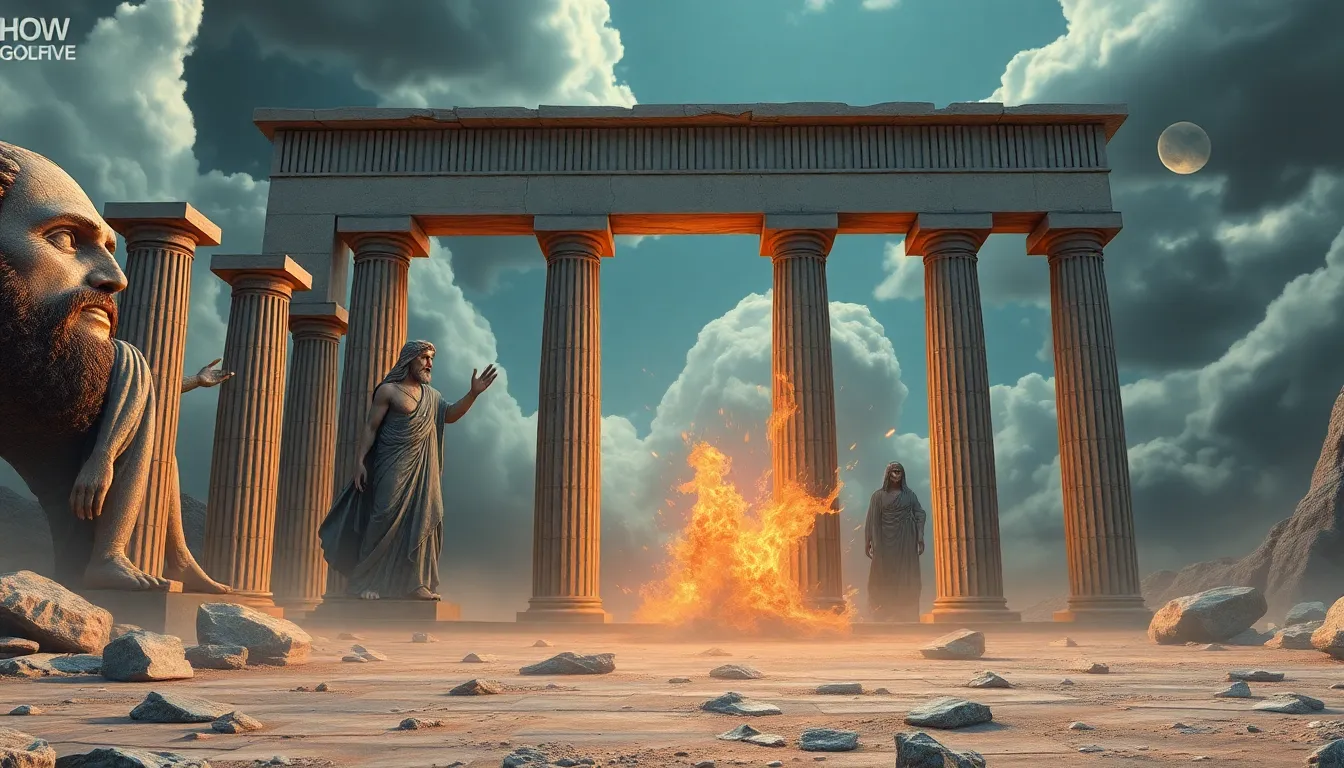How Greek Creation Myths Address the Nature of Good and Evil
I. Introduction
Greek mythology is rich with creation myths that not only explain the origins of the world but also delve deeply into the nature of good and evil. These myths serve as a tapestry of stories that reflect the complexities of morality, providing insights into how the ancient Greeks understood their universe. Understanding these narratives is crucial for grasping the philosophical underpinnings of good and evil as perceived in Greek thought.
This article aims to explore how Greek creation myths address the dual concepts of good and evil, examining the narratives, characters, and moral lessons embedded in these ancient tales.
II. The Genesis of the Cosmos: Chaos and Order
In the beginning, there was Chaos, a primordial void from which all things emerged. Chaos represents the initial state of disorder and potential, a blank canvas upon which the fabric of reality would be woven. From this chaos arose the first entities: Gaia (Earth), Tartarus (the abyss), and Eros (Love), signifying the emergence of order and structure.
- Gaia: The personification of Earth, she represents fertility and the nurturing aspect of creation.
- Tartarus: A deep, dark pit used for punishment, symbolizing the darker aspects of existence and the consequences of evil.
- Eros: The force of love and attraction that binds creation, highlighting the importance of relationships in establishing order.
The symbolism of chaos serves as a backdrop for the interpretation of good and evil. Chaos can be seen as the potential for both creation and destruction, embodying the idea that good and evil are often intertwined in the fabric of existence.
III. The Role of the Titans: Ambivalence of Power
The Titans, descendants of Uranus and Gaia, represent a significant shift in the mythological narrative. They embody power and authority, but their actions carry moral ambiguity. Figures like Cronus and Rhea illustrate this complexity.
- Cronus: The leader of the Titans, who overthrew his father Uranus to gain power. His fear of being overthrown led him to consume his own children, showcasing the dark side of ambition.
- Rhea: The mother of the Olympians, who devised a plan to save her son Zeus from Cronus’s tyranny, symbolizing maternal protection and resistance against evil.
The actions of the Titans raise questions about morality. Are their deeds justified in the pursuit of power? This ambivalence allows for a nuanced exploration of good and evil, illustrating that motivations can be complex and multifaceted.
IV. The Rise of the Olympians: Defining Good and Evil
The transition from Titans to Olympians marks a significant evolution in the Greek mythological landscape. The Olympians, led by Zeus, establish a new order that redefines the concepts of good and evil.
- Zeus: The king of the gods, represents justice and order but is also known for his numerous transgressions, illustrating the duality of power.
- Hera: The goddess of marriage, often portrayed as vengeful, reflecting the complexities of loyalty and betrayal.
- Prometheus: A Titan who defied Zeus by giving fire to humanity, symbolizing rebellion and the quest for knowledge.
Through the actions and relationships of the Olympians, a new moral framework emerges. They exemplify virtues and vices, establishing societal norms that dictate what is considered good and evil.
V. Myths of Creation: The Duality of Existence
Creation stories, such as Hesiod’s “Theogony,” provide insight into the duality of existence. The interplay between light and darkness, order and chaos, is central to understanding the Greek worldview.
- Light vs. Darkness: Light symbolizes knowledge, goodness, and order, while darkness represents ignorance, evil, and chaos.
- Order vs. Chaos: The establishment of order from chaos reflects the ongoing struggle of existence and the pursuit of harmony.
This duality has profound philosophical implications, suggesting that good and evil are not absolute but exist on a continuum, shaped by context and interpretation.
VI. The Role of Mythic Heroes: Exemplars of Virtue and Vice
Greek heroes such as Heracles and Odysseus serve as exemplars of human experience, navigating journeys fraught with moral dilemmas and ethical challenges.
- Heracles: His labors exemplify courage and strength, but his struggles with rage and vengeance reveal the complexities of virtue.
- Odysseus: Known for his cunning and intelligence, his journey home reflects themes of loyalty, temptation, and the consequences of choices.
These hero myths reflect societal views on good and evil, illustrating the challenges of moral decision-making and the importance of personal growth.
VII. Punishment and Justice: The Underworld as a Moral Compass
The Underworld, ruled by Hades, serves as a crucial component of Greek mythology, embodying the concepts of retribution and reward.
- Hades: The god of the Underworld, representing the inevitability of death and the moral consequences of one’s actions.
- Minos: The judge of the dead, who determines the fate of souls based on their earthly deeds, emphasizing the importance of justice.
The Underworld reinforces the moral framework of good and evil, illustrating that actions have consequences, and providing a space for reflection on one’s life choices.
VIII. Conclusion
In summary, Greek creation myths offer profound insights into the nature of good and evil. From the chaotic beginnings of the cosmos to the establishment of order by the Olympians, these narratives explore the complexities of morality in human existence. The lasting impact of these myths continues to resonate in philosophical thought and cultural discussions, highlighting their relevance in contemporary moral discourse.
As we reflect on these ancient stories, we are reminded of the enduring questions surrounding good and evil, and the intricate dance between light and darkness that defines our shared human experience.




